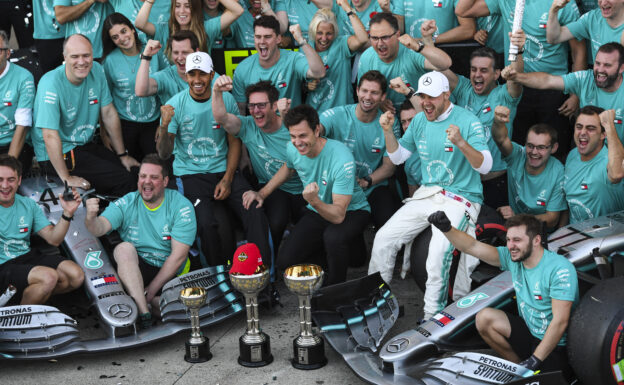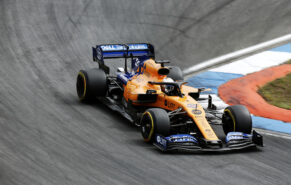Comparing the 2 Greatest Dynasties in F1 history

Mercedes' dominant run since the start of the hybrid era has been stunning. The German team has become Formula One's supreme outfit and no one would be brave enough to waste their bet365 bonus code in NJ betting against them in the 2020 season. Mercedes and Lewis Hamilton have won a couple of titles when they were not particularly favoured to do so in the last two years. However, the team tied Ferrari's run of six straight Constructors' titles in dominant fashion in 2019. How does their run compare with Ferrari's streak from 1999 to 2004?
First of all, comparing eras is a tricky situation in Formula One history. Different rules, different calendars and many different situations like the tyre war during Ferrari's dominant years make it a particular debate. Giving it a statistical look, the comparison makes more sense and can give the fans a little bit of perspective.

Schumacher wins at San Marino 2002
Comparing the two greatest dynasties in Formula One history just shows how deep a brand can get into the habit of winning. From 1999 to 2004, there were 101 Grands Prix, and Ferrari won 63 (62.3%). Since 2014, Mercedes won 86 out of 117 races (73.5%). Both numbers are astonishing, no doubt. It is amazing to see how much similarities can be found into the stats of these two incredible teams.
Looking at individuals, there is not much doubt in the two names that should come to mind: Michael Schumacher and Lewis Hamilton. The seven-time World Drivers' Champion won 50 races during Ferrari's six-year span of dominance. The English, a five-time champion, has won 60 races since Mercedes took Formula One by storm in 2014.
Regarding qualifying, Ferrari took 54 Pole Positions during their 101-race span of dominance (53,4%). Mercedes has taken 92 Poles in the 117 races since 2014, which is a fantastic 78.6%. Schumacher, dominant as always, took 43 of his teams 54 Poles between 1999 and 2004. Hamilton, on the other hand, has taken the top spot on Saturday 56 times out of 92.
Although both dynasties have aspects with a certain level of equality, they started in different ways. Ferrari's era started in 1999 with a lot of pressure due to the lack of Constructors' titles since 1983 and without a single WDC since 1979. In 1999, Ferrari had a rough year. McLaren-Mercedes had won the double in the previous campaign, but the Italian outfit started 1999 strong, winning three of the first four races and looking dominant. McLaren's World Champion, Mika Hakkinen, won two races in a row and took the championship lead, although Ferrari still led the Constructors' championship.

Schumacher & Barrichello, Ferrari F2003-GA, 2003 European GP
In the eighth race of 1999, Ferrari's number one driver, Schumacher, broke his leg at Silverstone. It was a big blow for Ferrari, although Eddie Irvine took the fight to Hakkinen for the Drivers' title, but fell short in the last race of the season. Ferrari won six races that year.
Then, Ferrari and Schumacher went on to beat McLaren in 2000 after winning 10 races. The 2001 campaign had no rivals for Schumacher as he took the title with a 58-point gap (a victory was worth 10 points in that era) as he took Ferrari's nine victories. 2002 was even better for Ferrari with Schumacher's teammate, Rubens Barrichello, finishing second in the WDC, albeit 67 points behind. The red team won 15 races in 2002, tying the then-record set by McLaren in 1988.
The 2003 campaign was Ferrari's toughest since 1999, as Schumacher beat Kimi Raikkonen by two points in the championship and Ferrari won only eight races, their lowest tally since 1999. 2004 was the return to dominant fashion. Schumacher won 12 of the first 13 races and he and his Brazilian teammate won three of the last five to tie the biggest tally of wins by a team in a single season.
For Mercedes, it was different. Their era of domination started like McLaren's in 1988, with a fight between their two drivers and a record-breaking pace. The difference from McLaren's run in the late 80s is that the fight between Hamilton and Nico Rosberg lasted for three seasons and Mercedes broke the previous record of most wins by a team in a single year each time. Mercedes set the record for most wins in a year with 19 wins in 21 Grands Prix in 2016.

Nico Rosberg & Lewis Hamilton
In 2017 and 2018, Mercedes run looked a bit more like Ferrari's due to Hamilton's fight against a driver from a different team: enter Sebastian Vettel and his hopes of a title with Ferrari. However, both seasons ended like the previous three, with Mercedes celebrating the double. In 2017 and 2018, Mercedes won 23 races, with Hamilton winning 20 and his new teammate Valtteri Bottas three.
2019 started a bit like the Hamilton-Rosberg years, with both Silver Arrows drivers with two victories after four races. Then, Hamilton won four races in a row and took a big advantage over his teammate in the WDC. After starting the season with five 1-2 finishes in a row and setting the record, Mercedes looked to dominate the entire season. However, after Red Bull and Max Verstappen ended Mercedes' winning streak at Austria, the German team has won four of the last eight races and has not started on Pole Position in the last six.
Even though Ferrari is looking stronger than Mercedes in raw pace since the summer break, the 1-3 at Suzuka sealed the sixth consecutive World Constructors' Championship for Mercedes. Additionally, the result secured that only the Mercedes drivers can win the WDC, which makes the German squad the first in F1 history to win six straight doubles and puts them ahead of Ferrari in terms of championships in a six-year span 12 to 11.
Certainly, Ferrari's run from 1999 to 2004 seemed impossible to beat, but one day Renault and Fernando Alonso arrived and put an end to it. Mercedes streak since 2014 has been even more dominant than Ferrari's last dynasty, but it will get harder and harder each year to try and perform at such a high level again. Would you bet on any team to swamp Mercedes in 2020 and end their glorious run? You would be a really brave person.
✅ Check out more posts with related topics:














LAST 3 F1 Fan COMMENTS